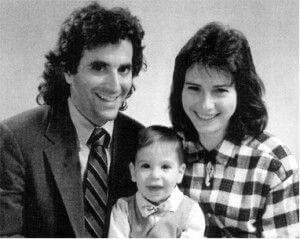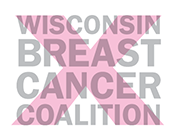In 1993, a 37-year-old Milwaukee native, Sherry Kohlenberg, spoke at the National Breast Cancer Coalition’s rally in Washington DC.
“This year 46,000 women will die of breast cancer,” she says. “I will probably be among these statistics. I will leave behind my husband and partner of 18 years, a motherless child, a devastated family and too many friends. I will not get to watch my son grow up, or grow old with my husband. And the worst part is that I am not alone. This family tragedy happens every time a new diagnosis is made, and every time a woman’s life is stolen by breast cancer.” . . . “I will not go silently,” Kohlenberg roars. “I will go shouting into that dark night; enough is enough.”1
Sadly, Sherry was correct. She died of breast cancer not long after this speech at the Capitol. And her family was devastated. But her voice continued. Her “shouting” continues to this day in our work as the Wisconsin Breast Cancer Coalition, which was founded by her sister, Linda, the following year.
Since 1994, WBCC has been the voice of women who want action. Human beings who want to be seen as more than a sea of pink ribbons. Women and their loved ones who want the reality of a breast cancer diagnosis to be made clear to policy makers. People who want solutions: earlier detection and better treatments for all women, meaningful, high-reward research and (dare we say it?) prevention of breast cancer.

Women like Sherry inspired our long-time mottos: STAND UP AND SPEAK OUT® and BEYOND THE PINK RIBBON®.
Progress has been made since Sherry’s speech in 1993. Death rates have decreased a bit, but over 43,000 women will still die in the US this year from breast cancer. That’s an “improvement” of only 3,000 lives in the last 30 years. But while mortality rates have dipped, incidence rates have been increasing a bit each year. Nearly 298,000 new breast cancer diagnoses will shake a family’s world in 2023. In 2020, 3,886,830 women in the US were living with breast cancer.2
That last statistic is shocking. It means that pretty much everyone is somehow affected by breast cancer and – therefore – everyone should have a seat at tables where advocacy work is being done.
My own journey to the WBCC began when my mom and grandmother were both in treatment for breast cancer in 1994. By early 1995, they had both died. This new organization became a way for me to channel my grief into something positive. I have been a committee volunteer, a Board Director, Board President, Policy Committee chair and Executive Director since then. Today, in “retirement”, I still serve on the Policy and Communications teams. I’ve made lifelong friends through WBCC and learned things I never would have expected to learn about the science and politics of breast cancer. But we’re still trying to find ways to dramatically reduce the number of diagnoses and deaths from breast cancer – even 30 years later.
If you have a talent to share, we need you. We currently have positions open on our Board that we’d like to fill with passionate people. WBCC has always been run almost entirely by volunteers – this is a working Board of Directors. Most of us had very little experience in advocacy when we started out. But we have great volunteers that support each other.
I won’t lie – there’s still a lot of work to be done. It’s incredibly important work though, because as Sherry Kohlenberg said 30 years ago, “enough is enough.”
Please let us hear from you: president@wibreastcancer.org.
1. https://www.nytimes.com/1993/08/15/magazine/the-anguished-politics-of-breast-cancer.html

 by
by